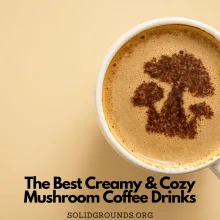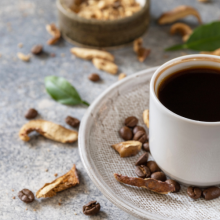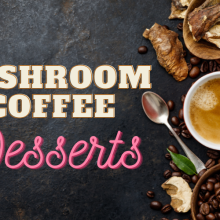How To Organize Successful Coffee Events | Solid Grounds
Organizing a successful coffee event requires careful planning across multiple areas. First, define the event’s goals, format, and target audience, then select an appropriate venue, date/time, and create a schedule. Develop a strong brand identity and incorporate educational elements like tastings, demonstrations, and talks. Create an engaging atmosphere with entertainment, activities, and branded swag.
Promote through social media, email marketing, and partnerships. Secure sponsors aligned with the event. Coordinate operations like ticketing, equipment, volunteers, setup/teardown, safety, and parking. Implement sustainability practices to reduce waste. After the event, gather feedback, create recaps, recognize contributors, analyze success metrics, and start planning for future events. Be prepared for potential downsides like financial risks, logistical challenges, and environmental impact.
Our #1 Recommended Mushroom Coffee | Our #2 Recommended Mushroom Coffee |
 |  |

How to Brew Up a Successful Coffee Event: A Comprehensive Playbook
Organizing a successful coffee event requires careful planning, execution, and attention to detail. From defining the purpose and target audience to creating an engaging experience and promoting the event effectively, there are numerous factors to consider. This comprehensive guide will walk you through the essential steps and best practices for hosting a memorable and impactful coffee event.
Coffee events have become increasingly popular, offering a unique opportunity to bring together coffee enthusiasts, industry professionals, and the local community. These events not only foster networking and education but also celebrate the rich culture and artistry of coffee. Whether it’s a tasting, competition, meetup, or educational workshop, coffee events provide a platform for people to connect over their shared passion for the beloved beverage.
Event Planning and Logistics
Successful event planning starts with clearly defining your goals and objectives. Are you aiming to educate attendees, promote a specific product or brand, or simply create a space for coffee lovers to mingle? Once you’ve established your purpose, you can determine the appropriate event format, such as a cupping session, latte art competition, or coffee-themed festival.
Selecting the right venue is crucial, considering factors like capacity, location accessibility, and ambiance. When setting the date and time, be mindful of potential conflicts with other local events or seasonal patterns that could impact attendance.
Creating a detailed agenda or schedule will help ensure a seamless flow and keep attendees engaged throughout the event. Budgeting is another critical aspect, as you’ll need to account for venue rental, equipment, catering, entertainment, and other expenses. Don’t forget to research and secure any necessary permits or licenses required for your event.
Branding and Experience
Developing a cohesive and memorable brand for your coffee event can significantly enhance the overall experience for attendees. Start by choosing a catchy and relevant name or theme that aligns with your event’s purpose and resonates with your target audience.
Craft a strong visual identity by designing an eye-catching logo, selecting complementary colors, and determining the overall aesthetic. Consistently apply these branding elements across all promotional materials, signage, and event collaterals to create a seamless and immersive experience.
Educational Components
Coffee events offer a unique opportunity to educate attendees on various aspects of coffee, from sourcing and roasting to brewing methods and flavor profiles. Consider incorporating educational elements such as:
- Coffee tastings or cuppings led by industry experts
- Barista skills demonstrations and workshops
- Latte art competitions or exhibitions
- Food and coffee pairing sessions
- Talks or panel discussions featuring coffee professionals, roasters, or farmers
By providing valuable learning experiences, you not only enhance the event’s appeal but also foster a deeper appreciation for the craft of coffee among attendees.
Entertainment and Engagement
While educational components are essential, don’t overlook the importance of creating an entertaining and engaging atmosphere. Live music performances, comedy acts, or other forms of entertainment can help set the mood and keep attendees energized throughout the event.
Interactive elements like photo booths, social media walls, or coffee-themed games and activities can encourage participation and create memorable experiences for attendees. Additionally, consider offering branded swag or giveaways to enhance the event’s overall appeal and provide attendees with a tangible memento.
Promotion and Marketing
Effective promotion and marketing are crucial for ensuring a successful turnout and reaching your target audience. Start by identifying your ideal attendees – coffee enthusiasts, industry professionals, foodies, or the local community – and tailor your messaging and promotional channels accordingly.
Leverage social media platforms like Instagram, Facebook, and Twitter to create buzz and engage with potential attendees. Share visually appealing content, event details, and behind-the-scenes glimpses to build excitement.
Email marketing campaigns can be an effective way to reach existing customers or subscribers, while strategic partnerships with local businesses, coffee shops, or influencers can help expand your reach.
Traditional advertising methods, such as print ads, flyers, or radio spots, can also be considered, depending on your target audience and budget.
Sponsorships and Partnerships
Securing sponsorships and partnerships can help offset the costs associated with organizing a coffee event while also providing valuable exposure for the sponsors. Identify potential sponsors whose values and target audience align with your event, such as coffee roasters, equipment manufacturers, or local businesses.
Craft appealing sponsorship packages that offer varying levels of visibility and benefits, such as brand exposure, product sampling opportunities, or speaking slots. Clearly outline the deliverables and ensure that sponsors have ample opportunities for activation and engagement during the event.
Operations and Logistics
Executing a seamless event requires meticulous planning and coordination of various operational and logistical elements:
- Registration and ticketing: Implement a streamlined process for attendees to register and purchase tickets, whether online or on-site.
- Equipment and supplies: Ensure you have all necessary equipment, such as coffee brewing gear, tasting supplies, sound systems, and furniture.
- Volunteer and staff coordination: Recruit and train volunteers or staff to assist with setup, registration, hospitality, and other tasks.
- Setup and tear down: Develop a comprehensive plan for setting up and breaking down the event space, including timelines and assigned responsibilities.
- Day-of coordination: Designate a lead coordinator or team to oversee the event’s execution, address any issues that arise, and ensure everything runs smoothly.
- Safety and security: Implement necessary safety protocols, such as emergency plans, crowd control measures, and secure storage for valuable equipment or products.
- Parking and transportation: Provide clear instructions and signage for parking, or consider arranging shuttle services for attendees if needed.
Sustainability Practices
As the coffee industry becomes increasingly focused on sustainability, it’s essential to incorporate eco-friendly practices into your event planning. Consider ways to reduce waste, such as prioritizing reusable or compostable materials for cups, plates, and utensils.
Collaborate with coffee roasters and vendors who prioritize sustainable sourcing and ethical trade practices. You can also explore opportunities to offset the event’s carbon footprint by partnering with organizations that plant trees or support environmental initiatives.
Post-Event Follow-Up
The work doesn’t stop once the event concludes. Follow-up activities are crucial for gathering valuable feedback, fostering ongoing engagement, and laying the groundwork for future events.
Distribute post-event surveys to attendees, sponsors, and vendors to gather insights on what worked well and areas for improvement. Create photo and video recaps to share on social media and with participants, highlighting the event’s highlights and special moments.
Don’t forget to recognize and thank sponsors, partners, and volunteers for their contributions. Measure the success of the event against your predefined goals and metrics, such as attendance, engagement, and revenue.
Conduct a thorough debrief with your event team to discuss lessons learned and identify areas for optimization. Use these insights to start preliminary planning for future events, building on the successes and addressing any challenges encountered.
Potential Downsides:
While coffee events can be incredibly rewarding and impactful, it’s important to be aware of potential downsides and challenges:
- Financial risks: Organizing a large-scale event can be costly, and there’s always a risk of not recouping expenses if attendance or sponsorship falls short.
- Time and resource commitment: Planning and executing a successful event requires a significant investment of time and resources, which may strain smaller organizations or teams.
- Competition with other events: Depending on the location and timing, your event may face competition from other local or industry events, making it challenging to attract attendees.
- Logistical challenges: Unforeseen issues with venues, vendors, or equipment can arise, requiring contingency plans and quick problem-solving.
- Environmental impact: Despite efforts to be sustainable, large events can still contribute to waste and carbon emissions, which may concern eco-conscious attendees.
By being proactive, meticulous in your planning, and prepared for potential challenges, you can mitigate these downsides and increase the likelihood of hosting a successful and memorable coffee event.
Our #1 Recommended Mushroom Coffee | Our #2 Recommended Mushroom Coffee |
 |  |
FAQs and Answers
How do you handle dietary restrictions and food allergies at a coffee event that involves food and beverage service?
Here are some tips for handling dietary restrictions and food allergies at a coffee event with food/beverage service:
- Ask about dietary needs during registration/ticketing process. Include questions about common food allergies (nuts, dairy, gluten, etc.) as well as other dietary preferences (vegan, vegetarian, etc.).
- Clearly label all food/drink items with ingredients and potential allergens. Use tenting cards, stickers or other signage to denote items containing common allergens.
- Provide allergen-free options. Work with your caterers/food vendors to ensure there are gluten-free, dairy-free, vegan and other allergy-friendly items available.
- Set up a designated allergen-free preparation/serving area kept completely separate from other food stations to prevent cross-contamination.
- Have epinephrine auto-injectors and other allergy emergency supplies on hand, along with staff trained to recognize and respond to allergic reactions.
- Give lanyards or other identifiers to attendees with food allergies so staff can easily recognize them.
- Consider having nut-free and other allergen-free sections/tables to give those attendees a safe area to dine.
- Provide clear ingredients lists for any food samples, coffee drinks with milk/flavorings etc.
The key is clear communication with attendees, proper labeling, separation of allergen prep areas, and being prepared with supplies/trained staff in case of emergencies.
What are some effective ways to manage crowd control and lines at popular stations or activities during a coffee event?
Here are some effective ways to manage crowd control and lines at popular stations or activities during a coffee event:
- Implement a queuing system: Set up stanchions or ropes to create organized lines with a single-file queue. Assign staff to monitor the lines and provide direction.
- Utilize timed entry or ticketing: For highly popular stations like latte art competitions or exclusive tastings, issue timed entry tickets to attendees to control the flow of people at designated time slots.
- Set up multiple stations: If there is high demand for a particular activity like coffee tastings, set up multiple identical stations to distribute the crowd across several lines.
- Provide line entertainment: Keep guests engaged while waiting in line by offering games, trivia, music, or other interactive elements to make the wait more enjoyable.
- Offer alternative activities: Have additional activities or exhibits available nearby to give people other options if a line is too long.
- Communicate wait times: Post clear signage indicating the approximate wait time for each popular station, allowing guests to plan accordingly.
- Encourage pre-ordering: If offering food or beverage items, enable pre-ordering through an app or website to reduce lines at purchase points.
- Increase staffing: Ensure you have enough staff stationed at crowded areas to assist with line management, answer questions, and keep things moving smoothly.
- Utilize event layout strategically: Position popular stations or activities in different areas of the venue to disperse crowds and avoid bottlenecks.
Effective crowd control requires proactive planning, clear communication, sufficient staffing, and offering guests alternative options when lines get too long.
How can organizers incorporate engaging and educational content for children and families at a coffee event to make it more inclusive?
There are several ways organizers can incorporate engaging and educational content for children and families at a coffee event to make it more inclusive:
- Kids’ Coffee Workshops: Offer hands-on workshops where children can learn about the coffee-making process, from picking and roasting the beans to brewing different methods. Make it interactive with tastings, activities, and take-home materials.
- Latte Art Lessons: Set up a dedicated station for kids to learn simple latte art techniques using milk foam or chocolate syrup, teaching them the basics in a fun, messy way.
- Coffee Plant Garden: Create a small garden or display area showcasing different coffee plant varieties, allowing kids to see the plants and touch/smell the leaves and beans.
- Coffee Origins Map: Use a large, colorful map highlighting different coffee-growing regions and provide facts about each area’s unique flavor profiles and harvesting methods.
- Coffee Trivia/Games: Organize family-friendly coffee trivia games, scavenger hunts or puzzles throughout the event venue to keep kids engaged and learning.
- Coffee Lab Experiments: Set up an “experiment station” to demonstrate the science behind coffee, such as showing how temperature affects flavor or observing coffee bean density.
- Arts & Crafts: Provide coffee-themed arts and crafts like decorating mugs, making coffee bean art/jewelry, or coffee painting.
- Barista Challenge: Have a kids/family division of any barista skills competitions like latte art or brewing techniques.
- Coffee Storytelling: Invite speakers or performers to share tales and folklore from coffee’s rich cultural history.
- Coffee Menu for Kids: Offer kid-friendly coffee-based drinks like iced coffee/cocoa blends or coffee milkshakes they can order from a special menu.
The key is providing hands-on activities and bite-sized educational content to engage kids while celebrating coffee’s flavors and traditions.
What insurance policies or liability coverage should event organizers consider obtaining for a coffee event?
When organizing a coffee event, it’s crucial to have appropriate insurance policies and liability coverage in place to protect against potential risks and liabilities. Here are some types of insurance that event organizers should consider:
- General Liability Insurance: This is a must-have for any event, as it covers third-party bodily injury, property damage, and personal injury claims that may arise during the event. It protects the organizers from lawsuits and provides coverage for legal fees and settlements.
- Liquor Liability Insurance: If alcoholic beverages (including coffee-based cocktails) will be served at the event, liquor liability insurance is essential. It covers claims related to alcohol-related incidents, such as injuries or property damage caused by intoxicated attendees.
- Event Cancellation/Postponement Insurance: This insurance covers financial losses if the event needs to be canceled or postponed due to circumstances beyond the organizer’s control, such as severe weather, natural disasters, or other unforeseen events.
- Vendor/Exhibitor Insurance: If there will be vendors, exhibitors, or sponsors at the event, consider requiring them to have their own liability insurance and add the event organizers as additional insured parties on their policies.
- Workers’ Compensation Insurance: If the event organizers will have employees or volunteers working at the event, workers’ compensation insurance is typically required by law to cover work-related injuries or illnesses.
- Product Liability Insurance: If the event involves selling or distributing food, beverages, or other products, product liability insurance can protect against claims related to product defects or contamination.
- Equipment/Property Insurance: This coverage protects against damage, theft, or loss of equipment, supplies, or other property used for the event.
It’s recommended to work with an insurance agent or broker who specializes in event coverage to ensure that the appropriate policies and coverage limits are obtained based on the event’s size, location, and specific activities. Additionally, event organizers should review the venue’s insurance requirements and any contractual obligations related to insurance coverage.
How can coffee event organizers effectively manage and train volunteers to ensure a smooth event experience for attendees?
Managing and training volunteers effectively is crucial for ensuring a smooth and successful coffee event experience for attendees. Here are some strategies organizers can implement:
- Volunteer Recruitment and Screening
- Clearly define the roles and responsibilities for each volunteer position
- Recruit volunteers well in advance and have a system for vetting and selecting reliable individuals
- Consider reaching out to local community groups, schools, or coffee enthusiast clubs for volunteer recruitment
- Comprehensive Training
- Provide detailed training sessions that cover event logistics, volunteer roles, customer service, and any specific skills required (e.g., coffee brewing, food handling)
- Use a combination of written materials, videos, and hands-on demonstrations during training
- Ensure volunteers understand the event’s goals, schedule, and layout
- Volunteer Management and Communication
- Assign experienced volunteer coordinators or team leaders to oversee and support volunteers during the event
- Implement a clear communication plan, such as group chats or radio channels, to relay important updates or address issues
- Schedule regular check-ins or briefings with volunteers throughout the event
- Volunteer Recognition and Appreciation
- Provide volunteers with branded apparel, name tags, and other identifiers for easy recognition
- Offer incentives or perks, such as free coffee, food vouchers, or event merchandise
- Express gratitude and recognize outstanding volunteer contributions during and after the event
- Volunteer Scheduling and Rotation
- Create detailed shift schedules to ensure adequate coverage across all areas and tasks
- Build in breaks and rotations to prevent volunteer burnout or fatigue
- Have a contingency plan for last-minute volunteer absences or emergencies
- Post-Event Feedback and Evaluation
- Gather feedback from volunteers on their experience, areas for improvement, and suggestions
- Evaluate volunteer performance and identify individuals who could take on leadership roles in future events
- Use the feedback to refine volunteer management strategies for subsequent events
By implementing a structured volunteer program with proper training, management, and recognition, coffee event organizers can ensure a dedicated and engaged team of volunteers, ultimately enhancing the overall attendee experience.






